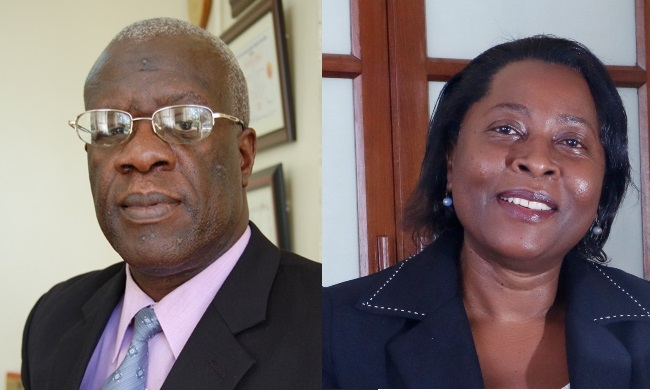The former Principal, College of Health Sciences (CHS) and Professor of Internal Medicine, Prof. Nelson K. Sewankambo and Prof. Sarah Kiguli, a Professor of Pediatrics and Child Health in the School of Medicine, CHS, Makerere University have been awarded five-year grants by the Fogarty International Center. Prof. Sewankambo’s African Association for Health Professions Education and Research project award was received under the Infectious Diseases Institute while Prof. Kiguli’s award is one of seven five-year grants by the Fogarty International Center’s Health-Professional Education Partnership Initiative (HEPI) to African Medical Schools.
According to the announcement published in Fogarty’s Global Health Matters newsletter, the seven projects will be awarded about US$22 million over five years, through a new program funded by the President’s Emergency Plan for AIDS Relief (PEPFAR). Makerere University and the Mbarara University of Science and Technology, Addis Ababa University, University of Nairobi, Eduardo Mondlane University, Muhimbili University of Health and Allied Science and the University of Zimbabwe will each receive part of the US$22million funding.
The award to Prof. Kiguli’s project; Health Professions Education and Training for Strengthening the Health System and Services in Uganda, will help to scale up the training of health professionals through a partnership between medical and nursing education institutions in Uganda and the US. Professor Kiguli is the Principal Investigator of a team of Health Professionals from the College of Health Sciences, Makerere University, with partnership from Busitema University, Kabale University, Clarke’s International University, Mulago School of Nursing and Midwifery, Yale University and Johns Hopkins University.
Additionally, a related award will provide nearly US$4 million over five years to fund the African Forum for Research and Education in Health (AFREhealth). The AFREhealth award to Makerere University will enable the institution to serve as a leadership and convening organization to network African research and higher educational institutions to develop and share innovations, curricula and policy. Prof. Nelson K. Sewankambo, as well as Doctors Prisca Adejumo (University of Ibadan), Jean Bisimwa Nachega (Stellenbosch University) and Fatima Suleman (University of Kwazulu Natal) will serve as Principal Investigators to the project.
“Through this new program called HEPI, we are empowering African institutions to tackle the region’s most pressing health problems, improve the effectiveness and efficiency of the U.S. response to HIV/AIDS, and reduce the suffering and death the epidemic continues to cause across the region,” said Fogarty Director Dr. Roger I. Glass.
Reacting to the news of the award, the Vice Chancellor Prof. Barnabas Nawangwe congratulated both Prof. Nelson Sewankambo and Prof. Sarah Kiguli upon playing their part to strengthen Makerere University’s quest to be a research-led university, and a leader in health professions education.
“I wish to heartily congratulate Prof. Nelson Sewankambo and Prof. Sarah Kiguli upon reaffirming the College of Health Sciences’ and indeed Makerere University’s global reputation and the continent’s leading institution for innovation, training and research in the field of health sciences. I equally thank the Fogarty International Center for recognizing our groundbreaking innovations and supporting our aspirations to contribute to the training of a robust health care and research workforce in sub-Saharan Africa,” added Prof. Nawangwe.
For more information please contact:
Prof. Nelson K. Sewankambo, College of Health Sciences (CHS), Makerere University
Email: sewankam[at]infocom.co.ug, Mob: +256-782-366751
Prof. Sarah Kiguli, College of Health Sciences (CHS), Makerere University
Email: skwalube[at]yahoo.co.uk, Mob: +256-772-588044
Related links:
https://www.fic.nih.gov/News/GlobalHealthMatters/september-october-2018/Pages/african-health-education.aspx#awards
Issued by: Ms. Ritah Namisango, Principal Public Relations Officer, Makerere University, Email: pro[at]admin.mak.ac.ug
Please see Downloads for Press Release


 General16 hours ago
General16 hours ago
 General16 hours ago
General16 hours ago
 Humanities & Social Sciences2 weeks ago
Humanities & Social Sciences2 weeks ago
 General1 week ago
General1 week ago
 Agriculture & Environment2 weeks ago
Agriculture & Environment2 weeks ago


